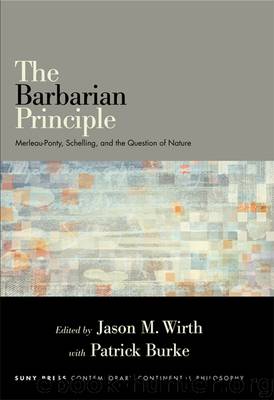The Barbarian Principle by Wirth Jason M

Author:Wirth, Jason M.
Language: eng
Format: epub
Publisher: State University of New York Press
Published: 2013-01-10T16:00:00+00:00
Notes
1. According to a manuscript of Merleau-Ponty held at the Bibliothèque Nationale (vol. XVI, 2), cited in Pascal Dupond, “Nature et logos,” Studia Phaenomenologica 3 (2003), 119. All translations from the French or the German are the responsibility of the author.
2. Two basic convictions, indeed, characterized Merleau-Ponty’s early philosophy. On the one hand, modern thought appears grounded on the cision of “naturing thought” (Descartes’ self-certain “natural light” in the Regulae, the order of truth, agency, Sinngebung, ground-breaking questioning, inventiveness) from “natured thought” (the “natural inclination” of the Cartesian sixth Meditation, the order of preexisting facts, positivity, solidified Sinnzusammenhänge, mere reproduction of objectified givens). This antagonism brings into view the riddle of consciousness emerging within a Nature from which it never manages to set itself wholly free. On the other hand, modern philosophy has failed in the attempt to bridge this fundamental chasm between receptivity and spontaneity, naturalism and reflexive analysis. Merleau-Ponty longed to overcome this separation and so to accomplish what, in his view, was the concealed telos of modern thought. Therefore, he intended to elucidate the articulation of the “naturing” and the “natured” orders, that is, of truth and facticity, reflection and the un-reflected residuum or, as he used to say, philosophy and “non-philosophy.” His early works were consequently driven by the certainty that only “the naturing order [le naturant]” had the force to prevail over its own cision from “the natured order [le naturé],” or, in other words, that the effective “founding order” is liberty or spirit and not Nature, notwithstanding their reciprocal commitment grounding of each other.
3. Alluding, of course, to the visual disorder in which a single object appears as two objects. This “double vision” (indeed a person affected by diplopia sees two images of the same object) usually results from the misalignment of the two eyes relative to each other.
4. Alexander Bird, Thomas Kuhn (Princeton: Princeton University Press: 2000), 49.
5. Merleau-Ponty’s emphasis.
6. Renaud Barbaras, “A Phenomenology of Life,” The Cambridge Companion to Merleau-Ponty, ed. T. Carman and M. B. N. Hansen (Cambridge: Cambridge University Press: 2005), 219.
7. Beate Krais and Gunter Gebauer, Habitus (Bielefeld: Transcript Verlag, 2002), 22–23.
8. Hans-Herbert Kögler, “Alienation as Epistemological Source: Reflexivity after Mannheim and Bourdieu,” Social Epistemology 11 (1997), 149.
9. Françoise Dastur, Chair et langage. Essais sur Merleau-Ponty (Fougères: Encre Marine, 2001), 82.
10. Stated by Merleau-Ponty at the Collège de France and reported in: Xavier Tilliette, “La démarche ontologique de Merleau-Ponty,” Maurice Merleau-Ponty. Le philosophe et son langage, ed. François Heidsieck (Paris: Vrin, 1993), 380, emphasis added.
11. See also VI1, 320.
12. Merleau-Ponty’s words are: “qui garde un sens hors de son contexte historique, qui n’a même de sens que hors de ce contexte.”
13. The quote refers to: Lucien Herr, “Hegel,” in: Choix d’écrits, volume 2 (Paris: Rieder 1932), 109–146.
14. Robert Vallier, “Être sauvage and the Barbarous Principle: Merleau-Ponty’s Reading of Schelling,” Chiasmi International 2 (2000), 85. A new version of this essay is the seventh chapter of this present volume.
15. Vallier, 85.
16. Renaud Barbaras, “Merleau-Ponty et la nature,” Chiasmi International 2 (2000), 52.
Download
This site does not store any files on its server. We only index and link to content provided by other sites. Please contact the content providers to delete copyright contents if any and email us, we'll remove relevant links or contents immediately.
| Deconstruction | Existentialism |
| Humanism | Phenomenology |
| Pragmatism | Rationalism |
| Structuralism | Transcendentalism |
| Utilitarianism |
The remains of the day by Kazuo Ishiguro(8947)
Tools of Titans by Timothy Ferriss(8346)
Giovanni's Room by James Baldwin(7301)
The Black Swan by Nassim Nicholas Taleb(7086)
Inner Engineering: A Yogi's Guide to Joy by Sadhguru(6776)
The Way of Zen by Alan W. Watts(6575)
Asking the Right Questions: A Guide to Critical Thinking by M. Neil Browne & Stuart M. Keeley(5741)
The Power of Now: A Guide to Spiritual Enlightenment by Eckhart Tolle(5725)
The Six Wives Of Henry VIII (WOMEN IN HISTORY) by Fraser Antonia(5486)
Astrophysics for People in a Hurry by Neil DeGrasse Tyson(5169)
Housekeeping by Marilynne Robinson(4420)
12 Rules for Life by Jordan B. Peterson(4292)
Double Down (Diary of a Wimpy Kid Book 11) by Jeff Kinney(4252)
The Ethical Slut by Janet W. Hardy(4232)
Skin in the Game by Nassim Nicholas Taleb(4223)
Ikigai by Héctor García & Francesc Miralles(4219)
The Art of Happiness by The Dalai Lama(4115)
Skin in the Game: Hidden Asymmetries in Daily Life by Nassim Nicholas Taleb(3973)
Walking by Henry David Thoreau(3939)
